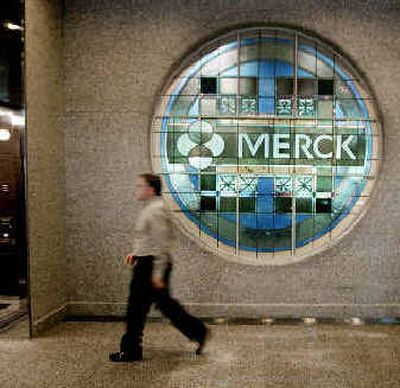Merck shares fall after report it hid, denied Vioxx dangers

WHITEHOUSE STATION, N.J. — Shares of Merck & Co. plunged more than 10 percent Monday after a media report said that documents show the pharmaceutical giant hid or denied evidence for years that its blockbuster arthritis drug Vioxx cause heart problems.
Merck, one of the world’s top five drug makers, pulled the arthritis and acute pain drug from the market worldwide on Sept. 30, saying it was acting in patients’ best interest. Vioxx has been taken by about 20 million Americans and had produced 11 percent of Merck’s total revenues.
Also on Monday, Prudential Equity Group analyst Tim Anderson downgraded the stock’s rating to neutral from overweight. Anderson wrote that he believes there is value in the company’s drug pipeline but said it is likely to get lost in the negative Vioxx coverage.
Additionally, Standard & Poor’s placed Merck on CreditWatch with negative implications, which sends a strong signal that the company’s debt could be downgraded within the next three months. When Merck withdrew Vioxx, S&P lowered its outlook to negative from stable. The additional, more serious step taken Monday reflects the momentum in the Vioxx litigation and the delay in launching Arcoxia, Vioxx’s successor drugs, said S&P analyst Arthur Wong.
Hundreds of lawsuits have been filed against Merck over Vioxx and one analyst believes it could cost the company up to $12 billion. Last Friday, the FDA said it wouldn’t approve Arcoxia without additional safety and efficacy information. Wong said it look like the drug will be delayed more than a year.
Merck shares were down $3.19, or 10.2 percent, at $28.12 on the New York Stock Exchange after The Wall Street Journal reported that internal e-mails and marketing materials show the company knew as far back as 2000 that Vioxx was linked to an increased risk of heart attack but tried to discredit such evidence.
Despite a March 9, 2000 e-mail from Merck research director Edward Scolnick to colleagues conceding an elevated risk of heart attack and stroke was “clearly there,” according to the newspaper, Merck continued to try to discredit academic researchers critical of the drug.
The Journal reported that one training document from Merck listed potentially difficult questions about the drug and stated in capital letters, “DODGE!”
Merck declined comment on the article. Last Friday, Merck acknowledged some sealed trial documents had been made public, noting that in other similar court cases documents had been leaked to advance the plaintiffs’ lawyers interests. It said that it “acted responsibly and appropriately as it developed and marketed Vioxx.”
Merck shares had been trading in the $45 range until the withdrawal announcement, plunged to the mid $30s that day and have hovered just above $30 since then. The stock price was as high as $49 per share in February and was slightly above $90 at the end of 2000, before the recession.